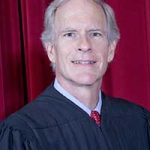Supreme Court rules for landowners in ACP suit
Published 9:27 pm Friday, July 14, 2017
The Virginia Supreme Court has reversed a decision by Buckingham Circuit Court Judge Donald C. Blessing who ruled that a March 6, 2015 letter from Atlantic Coast Pipeline (ACP) LLC satisfied a section of the Code of Virginia stipulating requirements of a natural gas company’s issuance of notices of intent to enter private property.
In the eight-page opinion, released Thursday by the court, Justice William C. Mims said ACP’s “on or after” notices “did not ‘set forth the date of the intended entry’ as required by code (section) 56-49.01(C). Accordingly, we reverse the circuit court’s judgment and remand for further proceedings consistent with this opinion.”
Landowners Charles and Linda Chaffins, Michael Huntley and Beverly McQuary filed appeal following Blessings’ decision. The individuals’ own land would be crossed by the proposed natural gas pipeline’s route.
“The court’s ruling is consistent with the rulings of every other state and federal court that has looked at this issue,” Dominion spokesman Aaron Ruby said in response to the ruling. “We’re hopeful today’s ruling will settle this issue and allow us to continue working cooperatively with landowners to develop infrastructure in a way that minimizes impacts to the environment and their properties.”
He said Dominion respected the court’s ruling regarding landowner notifications. “We proactively addressed this issue by revising our notices to include specific
dates of entry before surveying these properties. Going forward, we’ll continue our company’s policy of providing landowners with specific dates of entry prior to surveying.”
Dominion is leading the ACP, a 600-mile natural gas pipeline that would begin in West Virginia, span Virginia and end in North Carolina. The project, which includes a proposed 53,783-horsepower compressor station to be located along Route 56 between Shelton Store and Union Hill roads in Buckingham, has been been hotly contested in the county.
Ruby called the ACP a “vitally important infrastructure project that will meet the urgent and growing needs of public utilities in our region to generate cleaner electricity, heat homes for a growing population and power local businesses in a diversifying economy.”
According to the opinion, in March 2015, ACP sent the landowners letters seeking permission to enter their properties to conduct preliminary surveys and studies. The letters explained that conducting the surveys and environmental studies is required as part of the permitting process for the pipeline.
“When (the) landowners withheld their permission, ACP provided notices of intent to enter their properties ‘on or after April 27, 2015’ pursuant to code (section) 56-49.01. The notices explained that code (section) 56-49.01 ‘authorizes certain natural gas companies to enter upon property, without permission, for examinations, tests, hand auger borings, appraisals and surveys.’ However, rather than enter the properties at that time, ACP filed petitions for declaratory judgment against landowners. It sought an order declaring that the notices of intent to enter provided ACP with a right to enter landowners’ properties under code (section) 56-49.01.”
According to the opinion, the landowners separately filed demurrers, or contentions that a pleading does not state a cause of action or claims the pleading fails to state facts upon which the relief demanded can be granted.
“They argued, in part, that by only stating that the entry would occur ‘on or after April 27, 2015,’ the notices failed to ‘set forth the date of the intended entry’ as required by code (section) 56-49.01(C). The circuit court overruled the demurrers, finding ‘no flaw in the notification process that’s taken place,’ and ordered that
(the) landowners file responsive pleadings.”
On April 13, 2016, the circuit court issued a final order holding that ACP was entitled to enter landowners’ properties pursuant, according to the opinion.
According to Mims, the landowners maintained on appeal “that by only stating the entry would occur ‘on or after April 27, 2015,’ ACP’s notices of intent to enter failed to ‘set forth the date of the intended entry’ as required by code (section) 56-49.01(C). ACP responds that the statute does not require notices to provide dates certain upon which the entry will occur, but rather only the date of ‘intended,’ or planned, entry.”
Mims said the requirement “that a notice of intent to enter must ‘set forth the date of the intended entry’ has an unmistakable meaning. The notice must provide the landowner with dates certain upon which the natural gas company intends to enter the property. ACP’s ‘on or after’ notices did not do this. At best, they informed (the) landowners that it was possible the entry would occur on April 27, 2015. But they also reasonably implied that it could be an indeterminate amount of time later. In fact, the notices allow for the possibility that the entry could occur years after the stated date. This vagueness provided (the) landowners with no meaningful way of knowing when the entry would occur and thereby rendered the notices ineffective.”
ACP argued intervening events rendered the appeal moot. On June 17, 2016, after the circuit court issued its order, ACP sent the landowners additional notices of intent to enter their properties.
“These additional notices referenced the circuit court’s order, which ‘confirm[ed]’ ACP’s right to enter (the) landowners’ properties under the original notices. They then stated, ‘[a]ccordingly, [ACP] intends to enter upon [landowners’ properties] in order to perform studies and surveys’ between July 6, 2016 and July 11, 2016.”
According to the opinion, the circuit court’s order held that ACP is entitled to enter the landowners’ properties under the original notices. “The additional notices in no way repudiate the original notices, and ACP has refused to concede that the original notices are flawed. Accordingly, this case is not moot because there is an actual, ongoing controversy regarding ACP’s right under the original notices to enter (the) landowners’ properties for the purposes set forth in code (section) 56-49.01.”
“Friends of Buckingham (FOB) commends the recent Virginia Supreme Court decision reversing the Buckingham Circuit Court interpretation of the Virginia code on date of entry,” said FOB Chair Chad Oba. “Although this may prove to be inconvenient for the surveyors, it is miniscule in comparison to what is being asked of the property owners who would be forced through the power of eminent domain to sacrifice their private property rights and the intended use of their land. This is a deserving private property right and a step in the right direction as strengthening private rights is long overdue in Virginia. …”
“We applaud the fact that the Buckingham landowners argued successfully that Dominion’s policy was not adequate under the law,” said Joseph Jeeva Abbate, a spokesman for Yogaville Environmental Solutions. “Although Dominion may continue surveying without needing a federal certification activating eminent domain against property owners who oppose the ACP, they are now required to submit revised notices to the Buckingham court in order to proceed in their survey work. It is satisfying to know that there is at least some limit to Dominion’s ability to flaunt the law.”









